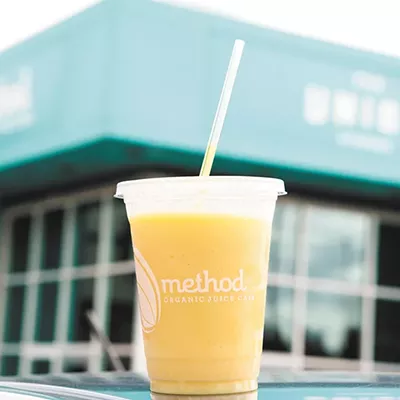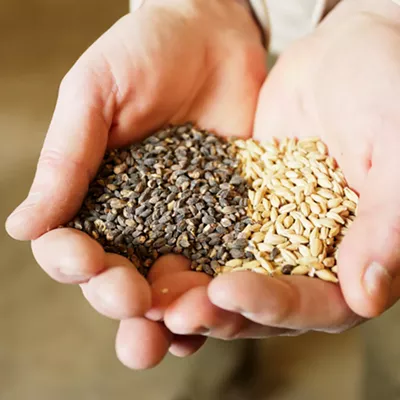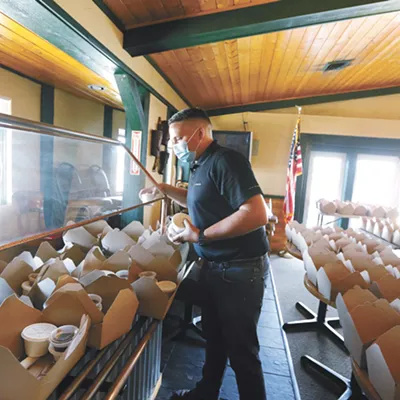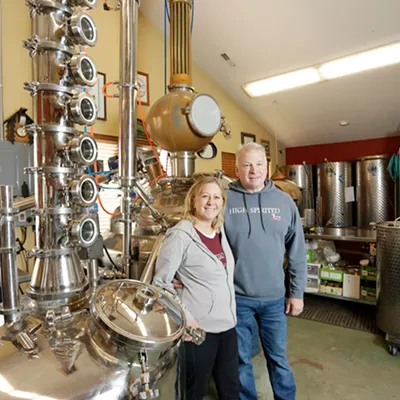Nose scrunched, she dumps the thick green sludge in her cup into the sink. “We’ve tasted some non-winners before this,” she says, as if to reassure herself.
On a late June afternoon in a small kitchen in the basement of Seven2, a downtown Spokane advertising agency, Robinson is devoted to creating the perfect green smoothie recipe for the company’s latest offshoot project: Method Organic Juice Café. She pulls an armful of mint, romaine lettuce and coconut water from the refrigerator and adds them to the counter — already overflowing with limes and lemons and apples.
Robinson turns to a white board, takes a deep breath and begins writing more ideas: cucumber, pear, mint, mango, romaine, coconut water.
She starts on a new batch — carefully counting out mint leaves and pear slices before adding them to a blender.
“It looks great!” she yells over the blender, which sounds like its powered by a jet engine.
This one gets raised eyebrows and smiles.
Troubleshooting by blender — and distributing endless sample cups of juice to the designers and copywriters working upstairs — is how Robinson devised the menu for Method. She says that during the process she’s found a love for juicing — replacing her meals with green smoothies like the one she’s perfecting today.
And that’s what Seven2 co-owner Nick Murto hopes in opening a juice bar here in Spokane — that people will try it and be converted. Murto says that juicing isn’t just a trend, but a full-scale health movement underway emphasizing healthier eating and plant-based diets.
He points to Starbucks. In November 2011, the coffee giant purchased the “Evolution Fresh” juice brand for $30 million, opening its first juice bar and fresh food outlet in Bellevue, Wash. A popular documentary Fat, Sick and Nearly Dead — which chronicles the staggering weight loss journeys of two obese men through juice diets — has inspired masses to purchase juicers and drink their meals.
“I think whether you’re vegan or not, everyone knows they need more vegetables,” Robinson says, pouring the next cupful.
“My life has totally changed,” Nick Murto says, on Method’s first day of business last week.
In a bright green T-shirt and running shoes, the 41-year-old says that he never could have imagined that he’d be opening a juice bar. Murto says that 10 years ago he was significantly heavier than he is now, and says his weight loss is thanks in part to juicing.
Murto, who has run Seven2 with co-owner Tyler Lafferty for the past 12 years, says his lifestyle is one that has always been active, but not necessarily healthy.
“I was running a ton, I was working out a ton — I just had a horribly unhealthy diet,” he says of his heavier years.
Things changed for Murto shortly after he turned 40.
“I went vegan, I gave up gluten and refined sugars and caffeine. And my life changed,” he says. “I felt so good, and so much healthier. And I even lost a bunch of weight.”
As a part of his new diet, he started making juices at home starting his day with his favorite green smoothie: “It’s a head of romaine lettuce, a big handful of spinach, some celery, an apple, a pear and a banana. You almost have to eat it. I like it.”
Much like the director of Fat, Sick and Nearly Dead, Murto decided to try a 30-day juice fast.
“I seriously got to the end of 30 days and I felt so good that I couldn’t go back to bringing all this stuff back in,” he says.
Spokane nutritionist and registered dietician Craig Hunt says that while juicing is not new, it has certainly picked up momentum lately as people have become more aware of the medicinal qualities of food. He says that juicing is a great option for people who have trouble eating the recommended servings of fruits and vegetables on a daily basis.
“If they can pop into a juice bar and get an on-the-go meal or snack that’s going to be loaded with vitamins and minerals and phytonutrients … that can actually be a really good thing.”
Hunt, who also teaches nutrition courses at Eastern Washington University, says that seeing what his students eat makes him think more juice bars should be available.
“One of their assignments is to record their food intake — and just about every student struggles with their fruit and vegetable intake,” he says. “It’s scary.”
Where Hunt starts to worry about the juicing fad is when it becomes a “single food diet.”
“I think that if you put America on juicing, we would lose billions of pounds. But the tough part is you have to kind of look around the corner at a year out or five years or 10 years out,” he says. “Where people falter is that after they’ve juiced, they’ve lost the weight… they haven’t learned how to go out to eat or [how to eat] on vacation.
“It’s kind of a way to put the blinders on and not be balanced,” he says.
Fasts — during which consumers are only consuming juice, and no other foods — can be where health problems arise, too. A Daily Mail article reports that too much juice can lead to dry skin, hair loss, low blood sugar and tooth decay. Hunt says that blending vegetables — as opposed to juicing them — can ensure that essential fibers aren’t lost.
But if a fresh juice or smoothie — like the ones on the menu at Method — replaces a breakfast or an afternoon snack, that’s where Hunt says juicing can really have beneficial effects.
Inside Method, a modernly adorned space gleaming with white-tiled walls and metal counters and dark brown wood panels, employees hand cups of Crayola-colored juices — sunshine yellow, Ferrari red, grass green — across the counter to customers. Robinson jokes that some customers say that the “Daily” — a blend of carrot, tomato, beet, cilantro, celery, lemon, lime and jalapeno — would be even better with vodka.
Customers tip back bright pink samples of the “Source” — a peanut-butter-and-jelly-tasting smoothie.
Murto says he wants this business to be more than just a place to get a juice, but “this friendly, welcoming, educational thing.”
He wants people to change their palates and try new things. He wants people to embrace their health.
“I want that,” he says. “I want people to feel like they’re a part of a movement by coming here.”
Method Organic Juice Café • 718 W. Riverside Ave. • Open M-F, 7:30 am – 4 pm • methodjuicecafe.com • 473-9579





















